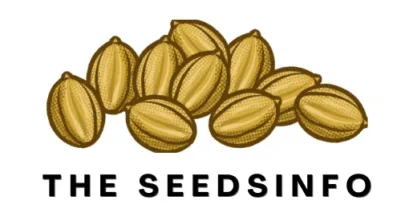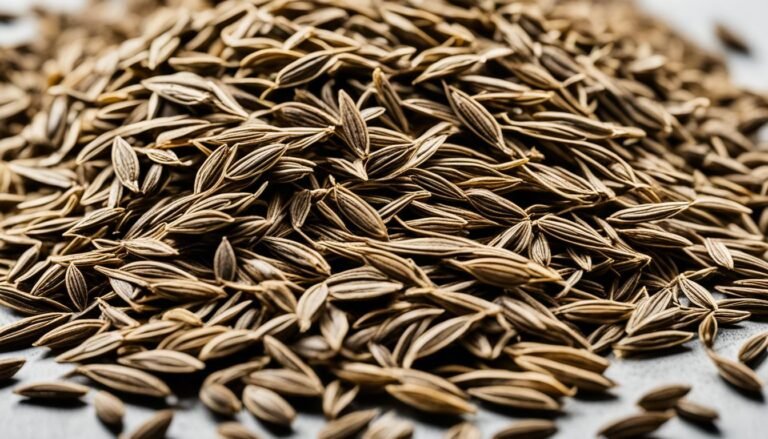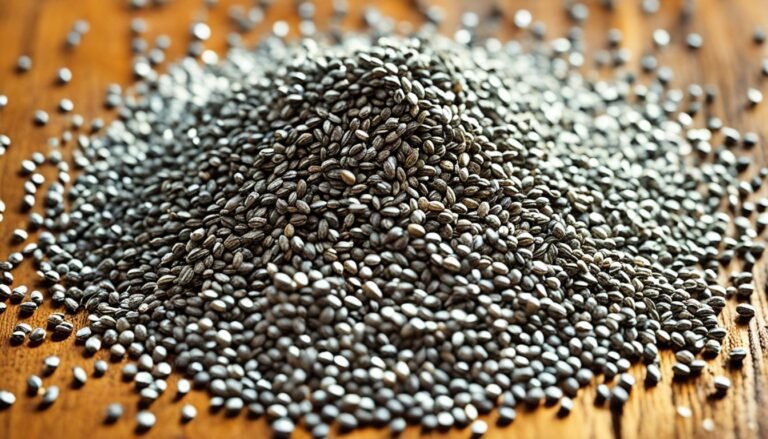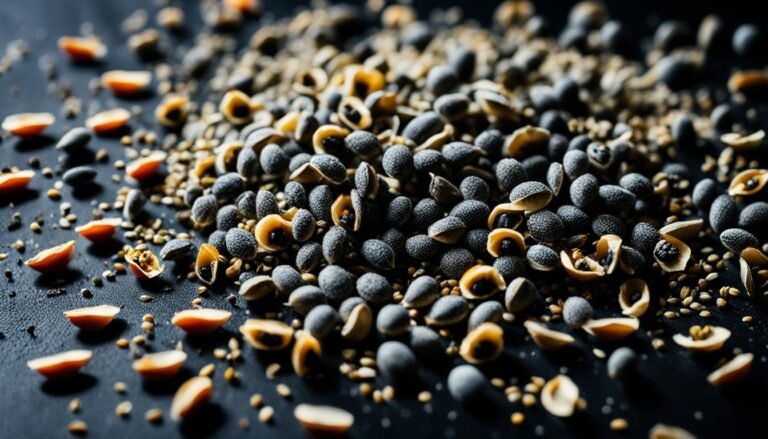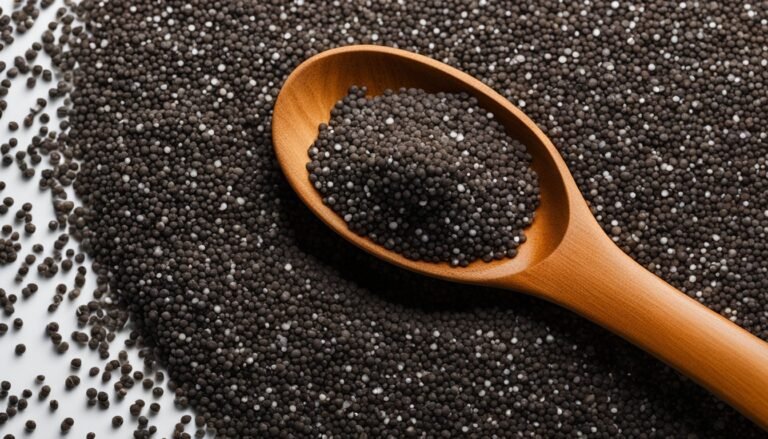Health Benefits of Cinnamon Leaves

Did you know that just 1 tablespoon of ground cinnamon has 1.4 grams of fiber? This spice has been valued for thousands of years. Now, cinnamon leaves are being recognized for their health benefits. They can help with blood sugar control, heart health, and brain function.
Key Takeaways
- Cinnamon leaves are rich in antioxidants and anti-inflammatory compounds that can combat chronic diseases.
- Cinnamon may help regulate blood sugar levels and improve insulin sensitivity, making it beneficial for those with type 2 diabetes.
- Consuming cinnamon can lower cholesterol and blood pressure, promoting heart health.
- Cinnamon exhibits antimicrobial and antiviral properties that may boost immune function.
- Cinnamon leaves contain neuroprotective compounds that may support brain health and function.
Introduction to Cinnamon Leaves
Cinnamon is a spice that has been loved for thousands of years. It comes from the bark of certain trees in the Cinnamomum family. These trees have a long history, dating back to ancient times.
There are two main types of cinnamon: Ceylon cinnamon and Cassia cinnamon. Ceylon cinnamon is also called “true” cinnamon. It is known for its delicate taste. Cassia cinnamon is the type you usually find in stores today.
Cinnamon: A Spice with Millennia of History
Cinnamon has been used for thousands of years. It was found in ancient Egypt, China, and the Roman Empire. People love it for its smell, taste, and health benefits.
This spice is a key ingredient in many foods and medicines. It’s used all over the world.
The Two Main Types: Ceylon and Cassia
- Cassia cinnamon is the darker type and is used a lot in the U.S.
- Ceylon cinnamon, or “true” cinnamon, is liked in other places for its milder taste. It also has less coumarin, which can be bad in large amounts.
Both Ceylon and Cassia cinnamon are good for you. They have antioxidants and can help with heart health and blood sugar. Exploring cinnamon leaves will show you why people have loved them for so long.
Powerful Antioxidant Properties
Cinnamon leaves are full of powerful antioxidants, like polyphenols. These compounds protect your body from free radicals. Free radicals can cause inflammation, chronic diseases, and aging.
Studies show that cinnamon supplements boost blood antioxidant levels and lower inflammation markers like C-reactive protein. Cinnamon’s antioxidants are so strong, it can be a natural food preservative. This keeps your favorite dishes fresh and tasty.
Cinnamon is the top herb and spice for its antioxidant levels. It fights free radicals and oxidative stress. This makes it a great support for your health and well-being.
Adding cinnamon to your diet helps boost your body’s defenses. It also lets you enjoy cinnamon’s great taste. This is a simple way to get healthier.

Cinnamon’s antioxidants are so strong, it can be a natural food preservative. It fights free radicals and oxidative stress. This spice is a great ally for your health and well-being.
Anti-Inflammatory Benefits
Cinnamon comes from the inner bark of the Cinnamomum tree. It’s known for its cinnamon leaf anti-inflammatory properties. The spice is full of antioxidants, especially cinnamaldehyde. These help to reduce inflammation in our bodies.
Inflammation is a natural response to injury or infection. But, chronic inflammation can lead to serious diseases like heart disease, cancer, and neurodegenerative disorders.
Using anti-inflammatory benefits of cinnamon leaves can lower your risk of these diseases. Cinnamon fights inflammation, making it a great addition to your diet and wellness plan.
Reducing Chronic Inflammation Risks
Chronic inflammation is a big health threat. But, cinnamon leaf anti-inflammatory properties can help. Studies show that eating cinnamon often can:
- Lower inflammatory markers like C-reactive protein (CRP) and interleukin-6 (IL-6).
- Help people with rheumatoid arthritis have fewer tender and swollen joints.
- Reduce blood pressure, which is good for your heart and blood vessels.
- Improve insulin sensitivity and lower the risk of type 2 diabetes, a disease linked to chronic inflammation.
Adding cinnamon’s anti-inflammatory properties to your life can protect your health in the long run. It can help fight chronic inflammation and related diseases.
| Cinnamon Compound | Anti-Inflammatory Effects |
|---|---|
| Cinnamaldehyde | Inhibits the production of inflammatory molecules like prostaglandins and leukotrienes |
| Eugenol | Reduces the activity of enzymes involved in inflammation, such as cyclooxygenase and lipoxygenase |
| Cinnamic acid | Exhibits anti-inflammatory properties by modulating signaling pathways and gene expression |
Heart Health Advantages
Cinnamon is linked to a lower risk of heart disease, the top cause of death worldwide. Studies show that taking at least 1.5 grams of cinnamon leaf daily can lower triglycerides, total cholesterol, LDL (bad) cholesterol, and blood sugar in those with metabolic disease. Cinnamon leaf for blood pressure can also help lower blood pressure after 8 weeks of regular use. These heart health benefits make cinnamon a great natural option.
Lowering Cholesterol and Blood Pressure
Cinnamon has antioxidants that can cut down the risk of heart disease. A study found that daily cinnamon leaf cholesterol reduction can lower total cholesterol and LDL, or bad cholesterol. Another study showed better cholesterol and triglyceride levels and lower blood sugar in those taking cinnamon supplements.
One study found that Type 2 diabetes patients taking cinnamon supplements daily saw big drops in blood sugar after 40 days. The American Diabetes Association notes that cinnamon isn’t as strong as diabetes medication but can help lower blood sugar.
Regular use of cinnamon leaf for blood pressure leads to a short-term drop in blood pressure. But, the cinnamon dose varies, so it’s unclear if it can be a treatment for high cholesterol. Cinnamon comes in forms like ground cinnamon, sticks, tea, and oil, with ground cinnamon most used for baking.

| Nutrient | Amount per 1 teaspoon (3g) of Ground Cinnamon |
|---|---|
| Calories | 7 kcal / 31 kJ |
| Protein | 0.1 g |
| Carbohydrate | 2 g |
| Fiber | 1.6 g |
Blood Sugar Regulation
Cinnamon is known for its ability to control blood sugar levels. It helps improve insulin sensitivity, which is key for managing diabetes and keeping blood glucose in check.
Cinnamon’s Impact on Insulin Sensitivity
Cinnamon can lower blood sugar by slowing down the digestion of carbs. It also acts like insulin, helping cells take in more glucose. Studies show that a small amount of cinnamon each day can lower fasting blood sugar and help manage blood sugar over time. This makes it a possible addition to diabetes treatment.
A study with 80 people having PCOS found that 1.5 grams of cinnamon a day for 12 weeks lowered insulin levels and made insulin work better. Another review in 2019 looked at cinnamon for type 2 diabetes and prediabetes. It found cinnamon could lower blood sugar and make insulin resistance worse.
In 2018, a review said cinnamon could cut down on long-term blood sugar levels by 0.27% to 0.83% in type 2 diabetes patients. It also showed cinnamon could lower blood sugar right after meals by stopping certain enzymes from working.
| Study | Findings |
|---|---|
| PCOS study | 1.5 grams of cinnamon powder daily for 12 weeks significantly reduced fasting insulin levels and improved insulin sensitivity. |
| 2019 systematic review | Cinnamon supplementation could significantly lower fasting blood sugar levels and insulin resistance compared to a placebo in individuals with type 2 diabetes and prediabetes. |
| 2018 review | Cinnamon reduced hemoglobin A1c by 0.27% to 0.83% and fasting blood sugar levels by up to 52.2 mg per deciliter in people with type 2 diabetes. |
While cinnamon looks promising for managing blood sugar, it shouldn’t be the only thing you do. A good diet, exercise, checking your blood sugar, and any doctor-prescribed treatments are also key. Always talk to a healthcare professional before adding cinnamon to your diabetes care plan.
Potential Cancer-Fighting Properties
Research is showing that cinnamon leaf might help fight cancer. Studies in test tubes and animals suggest that cinnamon extracts can slow down cancer cell growth and stop them from spreading. They can also stop new blood vessels from forming in tumors.
The antioxidants and anti-inflammatory parts of cinnamon leaf, like cinnamaldehyde, might be why it has these effects. More studies on people are needed to confirm this, but the early results look good for cinnamon in fighting cancer.
A 2010 study found that sulforaphane in broccoli could make breast cancer cells smaller and fewer by up to 75%. A 2006 study showed eating more beans could lower the risk of colorectal cancer coming back. These studies show that natural compounds in cinnamon leaf could be powerful against cancer.
| Compound | Cancer-Fighting Properties |
|---|---|
| Cinnamaldehyde | Suppresses Toll-like receptor 4 activation and exhibits anti-tumor effects through inhibition of multiple cellular pathways. |
| Procyanidin-B2 | Acts as a proteasome inhibitor and anti-proliferative agent in human prostate cancer cells. |
| Cinnamon Extract | Induces tumor cell death through inhibition of NFκB and AP1, and exhibits anti-inflammatory, cytotoxicity, and antilipidemic properties. |
We need more research, but what we know so far is promising. Adding cinnamon leaf to your diet could help in the fight against cancer. By using nature’s remedies, we can find new ways to support our health and well-being.
Health benefits of cinnamon leaves
Cinnamon leaves are packed with antioxidants, anti-inflammatory, and anti-cancer properties. They are also a great source of nutrients like calcium, potassium, magnesium, vitamin A, and fiber. These nutrients support overall health and well-being.
One major benefit of cinnamon leaves is their antioxidant profile. Cinnamon leaf oil can help grow healthy bacteria in the gut, aiding digestion and boosting the immune system. It may also balance brain chemicals, helping with depression, anxiety, and other mental issues.
The oil in cinnamon leaves can ease stomach issues like upset stomach, nausea, and diarrhea. Cinnameldehyde, a key compound, is a natural pain reliever that can help with arthritis pain and swelling. It may also help manage diabetes by improving insulin sensitivity.
Cinnamon leaf oil is even used in aromatherapy to boost sexual function. With its many nutrients and compounds, cinnamon leaves are a true cinnamon leaf nutrition powerhouse. They offer great cinnamon leaf health benefits for overall well-being.

Antimicrobial and Antiviral Effects
Cinnamon, especially its cinnamaldehyde, shows strong antimicrobial and antiviral effects. Studies in test tubes show it can stop some bacteria and fungi from growing. This includes Listeria and Salmonella, and fungi that cause respiratory infections.
Cinnamon extracts also fight viruses, possibly protecting against HIV-1, influenza, and Dengue. A 2004 study by Ranatunga et al. talked about growing and managing cinnamon. A 2012 article by Khasnavis and Pahan looked at sodium benzoate, a cinnamon metabolite.
We need more human studies, but cinnamon leaves could be a natural way to boost immune health and fight infections. Its antimicrobial and antiviral properties could help keep us well.
| Study | Findings |
|---|---|
| Ranatunga et al. (2004) | Discussed the cultivation and management of cinnamon. |
| Khasnavis and Pahan (2012) | Focused on sodium benzoate, a metabolite of cinnamon. |
| Kim et al. (2006) | Conducted research on the anti-diabetic effects of cinnamon extract on blood glucose in db/db mice. |
| Marchese et al. (2014) | Demonstrated the influence of in vitro simulated gastroduodenal digestion on the antibacterial activity of green tea. |
| Alinezhad et al. (2013) | Explored the antioxidant and antihemolytic activities of ethanolic extracts of Hyssopus officinalis L. |
Cinnamon leaves have many health benefits, including fighting bacteria and viruses. Adding cinnamon to your diet or using cinnamon extracts can help keep you healthy and support your immune system.
Neuroprotective Potential
Research shows cinnamon might be great for brain health. It could help fight Alzheimer’s disease by stopping a protein buildup. Cinnamon also protects neurons and boosts brain chemicals in Parkinson’s disease models.
Supporting Brain Health
More studies are needed to see how cinnamon helps the brain. But, cinnamon leaves could be good for thinking skills and fighting brain diseases. Cinnamaldehyde and trans-cinnamaldehyde in cinnamon are strong against inflammation and free radicals.
Studies looked at 40 cinnamon and brain function tests. They found cinnamon helps with learning, memory, and thinking. These tests used animals and even fruit flies.
One study showed cinnamon gum helped teens remember better after 40 days. Surprisingly, cinnamon worked well at any dose.
Cinnamon might also fight Alzheimer’s disease by stopping harmful brain plaques. Eugenol, cinnamic acid, and trans-cinnamaldehyde in cinnamon protect the brain too.
Both Ceylon and Cassia cinnamon are good for the brain. But Cassia has more coumarin, which is bad in large amounts. Be careful with how much and what kind of cinnamon you eat.
Conclusion
Cinnamon leaves are a powerful natural resource with many health benefits. They have strong antioxidants and anti-inflammatory effects. These can help with blood sugar, heart health, and protecting the brain.
Adding cinnamon leaves to your diet or as a supplement could boost your wellness. While we need more studies, the current research looks promising. Cinnamon leaves can fight bacteria, viruses, and cancer cells. They also help with menstrual cramps and keep skin and brain healthy.
Cinnamon leaves are a great choice for anyone wanting to improve their health. By using this spice daily, you’re taking a step towards a healthier life. The cinnamon leaf health benefits summary shows how amazing this natural remedy is.
FAQ
What are the health benefits of cinnamon leaves?
Cinnamon leaves are packed with antioxidants, anti-inflammatory agents, and antimicrobial properties. These compounds support heart health, help manage blood sugar, improve brain function, and may prevent cancer.
What are the key nutrients in cinnamon leaves?
Cinnamon leaves are a good source of vitamins and minerals like calcium, potassium, magnesium, and vitamin A. They also have fiber and antioxidants.
How can cinnamon leaves help with inflammation?
The antioxidants and cinnamaldehyde in cinnamon leaves fight inflammation. This can reduce the risk of diseases linked to chronic inflammation.
Can cinnamon leaves help with blood sugar management?
Yes, cinnamon can improve insulin sensitivity and slow down carbohydrate breakdown. This helps regulate blood sugar levels, aiding in diabetes management.
What are the antimicrobial and antiviral benefits of cinnamon leaves?
Cinnamon oil and extracts can stop the growth of harmful bacteria and viruses. This suggests cinnamon leaves may boost immune health and prevent infections.
How can cinnamon leaves support brain health?
Studies in animals show cinnamon may protect the brain. It can stop the buildup of proteins linked to Alzheimer’s and Parkinson’s diseases. It also helps balance neurotransmitters.
